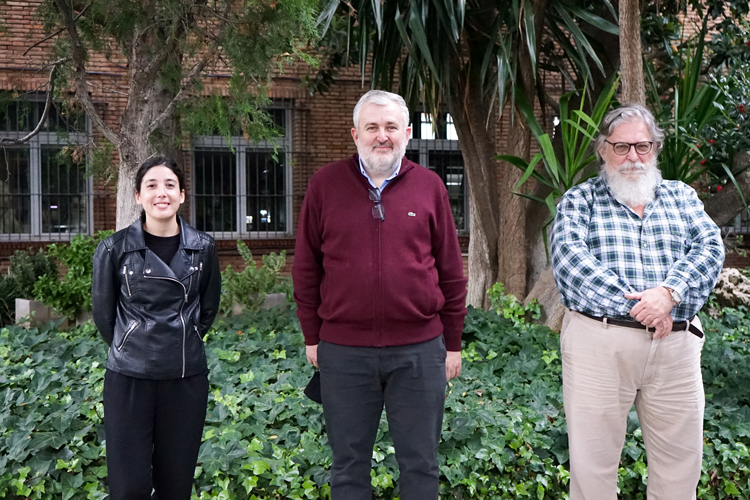Dr Mireia Singla defended her doctoral thesis in which she has developed a new seawater sampling system to collect microplastics in different locations around the world, giving for the first time a global vision of the presence of these pollutants.

Dr Mireia Singla with co-directors Dr Salvador Borrós and Dr Francesc Broto.
Microplastics have become an environmental problem, both primary microplastics – manufactured at the origin with applications in cosmetics, synthetic tissues, and so on – as well as secondary microplastics – caused due to the degradation of larger size plastic objects, such as bags, fishing nets, and so on – as they accumulate in seas and oceans in particular.
There is no standard measure for the term “microplastic,” but normally it refers to plastic particles between 0.5 mm and a few microns. This small size means that when they are in the marine environment, animals confuse the microplastics with plankton and eat them, which is how they enter the food chain.
Although different articles have been published demonstrating the presence of microplastics in highly localised areas of the planet, none of them shows a global overview of this environmental problem. That’s why Dr Mireia Singla carried her doctoral thesis entitled “Study of the role of microplastics in seawater based on samples collected from the oceans during the BWR 2015.” As part of the research, she has developed a new seawater sampling system that is capable of collecting microplastics and organic pollutants in surface seawaters in different locations around the globe. Thus, for the first time ever, Dr Singla has been able to show a distribution of the presence of microplastics, the pollution level, and the impact of their presence in oceans around the entire world.
The thesis was co-supervised by IQS professors Dr Salvador Borrós, of the Materials Engineering Group (GEMAT), and Dr Francesc Broto, of the university’s Chromatography section. The research has also been the result of the collaboration between IQS, the Barcelona Oceanic Navigation Foundation (FNOB) – the organiser of the Barcelona World Race BWR 2015 – and the spin-off Sailing Technologies.
Sampling, study, and characterisation of microplastics
The new sampling methodology consists of a specific device for microplastics, designed and developed by researchers at IQS and Sailing Technologies. The device was implemented on the sailboat One Planet, One Ocean, which participated in the BWR. During the race, the boat collected water samples from the Mediterranean Sea as well as the Atlantic, Pacific, and Indian oceans that contained microplastics and other organic pollutants suspended in the seawater.
This new in situ sampling device represents one step forward compared to normal sampling techniques, as it specifically retains the microplastics in suspension, which are collected by the sampling system itself.
The microplastics in the sample have been characterised both with regards to their morphology as well as their composition. The team has used complementary techniques such as optical microscopy, the SEM (Scanning Electron Microscope) and IR and RAMAN microscopes.
Finally, Dr Singla has developed a methodology for the elution of the SPE filtration cartridges. As a result, she has been able to establish the capacity of microplastics as concentrators of other organic pollutants present in the oceans that have a major environmental impact, such as PBDEs1.These pollutants have been characterised using the UPLC-MS-MS and HRGC-MS chromatographic techniques.
Collaboration with the FNOB
This research was carried as part of the collaboration between the FNOB and IQS, as part of the Barcelona World Race 2015 event, and received support from UNESCO.
This pioneering collaboration has also strengthened the science and sports partnership at the global level and has provided an environmental approach to a sporting event.

1 M.Singla, J.Díaz, F. Broto-Puig, S.Borrós, Sorption and release process of polybrominated diphenyl ethers (PBDEs) from different composition microplastics in aqueous medium: Solubility parameter approach, Environmental pollution, vol. 262 (2020)










